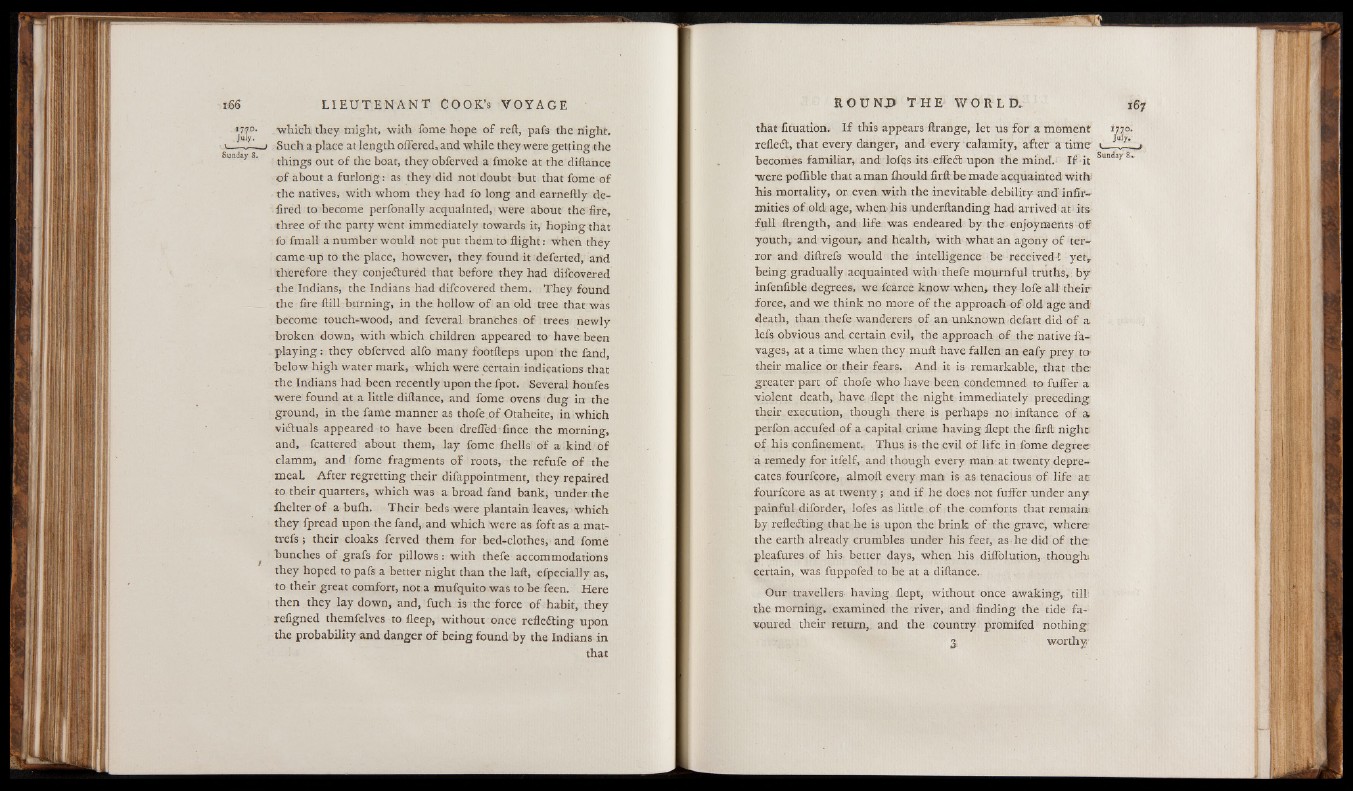
17-70. «which they might, with fome hope of reft, pafs the Wight.
— —j Such a place at length offered, and while they were getting the
* '■x 8‘ things out of the boat, they obferved a fmoke at the diftance
o f about a furlong: as they did not doubt but that fome of
the natives, with whom they had fo long and earneftly de-
fired to become perfonally acquainted, were about the fire,
three of the party went immediately towards it, hoping that
fo fmall a number would not put them to flight: when they
came-up to the place, however, they found it deferted, and
therefore they conjectured that before they had difcovered
the Indians, the Indians had difcovered them. They found
the fire ftill burning, in the hollow of an old tree that was
become touch-wood, and feveral branches of trees newly
broken down, with which children appeared to have been
playing: they obferved alfo many footfteps upon the fand,
below high water mark, which were certain indications that
the Indians had been recently upon the fpot. Several houfes
were found at a little diftance, and fome ovens dug in the
ground, in the fame manner as thofe.of Otaheite, in which
victuals appeared to have been drefied fince the morning,
and, fcattered about them, lay fome fhells of a kind of
clamm, and fome fragments of roots, the refufe of the
meaL After regretting their difappointment, they repaired
to their quarters, which was a broad fand bank, under the
fhelter of a bufh. Their beds were plantain leaves, which
they fpread upon the fand, and which were as foftas a mat-
trefs ; their cloaks ferved them for bed-clothes, and fome
bunches of grafs for pillows: with thefe accommodations
they hoped to pafs a better night than the laft, efpecially as,
to their great comfort, not a mufquito was to be feen. Here
then they lay down, and, fuch is the force of habit, they
refigned themfelves to ileep, without once reflecting upon
the probability and danger of being found by the Indians in
that
that fituation* If this appears ftrange, let us for a moment ipo.
refledt, that every danger, and every calamity, after a time < .
becomes familiar* and lofes its effect upon the mind. If it Sun ay "
were poflible that a man fhould firft be made acquainted with-
his mortality, or even with the inevitable debility and infirmities
of old age, when his underftanding had arrived at its
full ftrength, and life was endeared by the enjoyments o f
youth,, and vigour* and health, with what an agony of terror
and diftrefs would the intelligence be received! yetr
being gradually acquainted with-thefe mournful truths, by
infenfible degrees, we fcarce know when, they lofe all their
force, and we think no more of the approach of old age and
death, than thefe wanderers of an unknown defart did of a
lefs obvious and certain evil, the approach of the native fa-
vages, at a time when they muft have fallen an eafy prey to
their malice or their fears. And it is remarkable, that the
greater part of thofe who have been condemned to fuffer a
violent death, have flept the night immediately preceding;
their execution, though there is perhaps no inftance of a
perfon accufed of a capital crime having flept the firft night
of his confinement. Thus is the evil of life in fome degree
a remedy for itfelf, and though every man at twenty deprecates
fourfcore, almoft every man is as tenacious of life at
fourfcore as at twenty; and if he does not fuffer under any
painful diforder, lofes as little of the comforts that remains
by reflecting that he is upon the brink of the grave, where:
the earth already crumbles under his feet, as he did of the
pleafures of his- better days, when his difiolution, though:
certain, was fuppofed to be at a diftance.
Our travellers having flept, without once awaking, till
the morning, examined the river, and finding the tide favoured
their return, and the country promifed nothing;
3, worthy